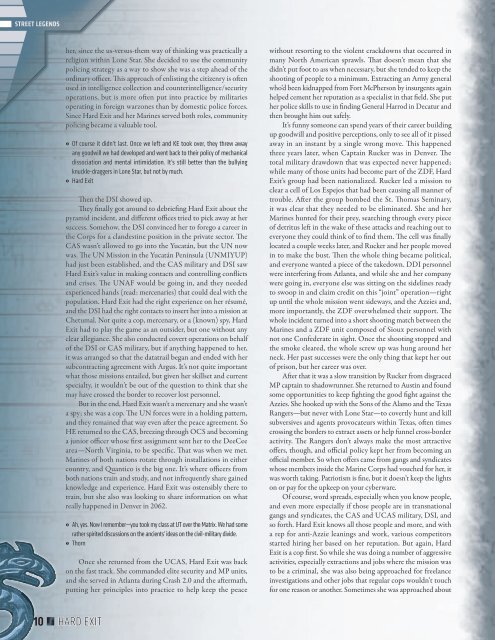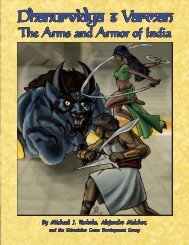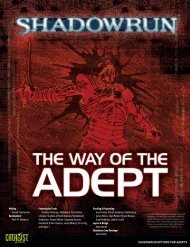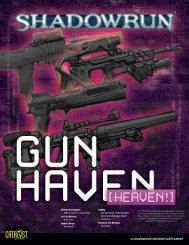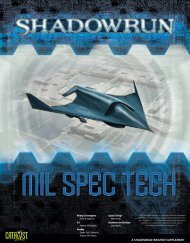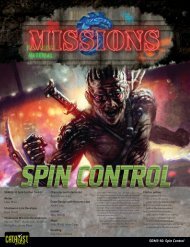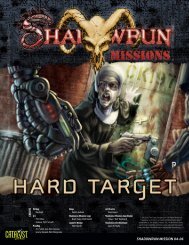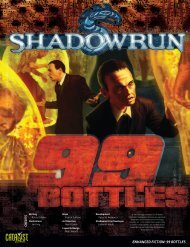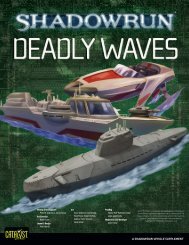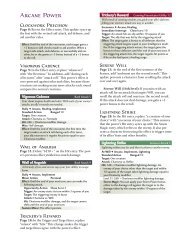Shadowrun: Street Legends Supplemental - Title
Shadowrun: Street Legends Supplemental - Title
Shadowrun: Street Legends Supplemental - Title
You also want an ePaper? Increase the reach of your titles
YUMPU automatically turns print PDFs into web optimized ePapers that Google loves.
STREET LEGENDS<br />
her, since the us-versus-them way of thinking was practically a<br />
religion within Lone Star. She decided to use the community<br />
policing strategy as a way to show she was a step ahead of the<br />
ordinary officer. This approach of enlisting the citizenry is often<br />
used in intelligence collection and counterintelligence/security<br />
operations, but is more often put into practice by militaries<br />
operating in foreign warzones than by domestic police forces.<br />
Since Hard Exit and her Marines served both roles, community<br />
policing became a valuable tool.<br />
> of course it didn’t last. once we left and Ke took over, they threw away<br />
any goodwill we had developed and went back to their policy of mechanical<br />
dissociation and mental intimidation. It’s still better than the bullying<br />
knuckle-draggers in lone Star, but not by much.<br />
> Hard exit<br />
Then the DSI showed up.<br />
They finally got around to debriefing Hard Exit about the<br />
pyramid incident, and different offices tried to pick away at her<br />
success. Somehow, the DSI convinced her to forego a career in<br />
the Corps for a clandestine position in the private sector. The<br />
CAS wasn’t allowed to go into the Yucatán, but the UN now<br />
was. The UN Mission in the Yucatán Peninsula (UNMIYUP)<br />
had just been established, and the CAS military and DSI saw<br />
Hard Exit’s value in making contacts and controlling conflicts<br />
and crises. The UNAF would be going in, and they needed<br />
experienced hands (read: mercenaries) that could deal with the<br />
population. Hard Exit had the right experience on her résumé,<br />
and the DSI had the right contacts to insert her into a mission at<br />
Chetumal. Not quite a cop, mercenary, or a (known) spy, Hard<br />
Exit had to play the game as an outsider, but one without any<br />
clear allegiance. She also conducted covert operations on behalf<br />
of the DSI or CAS military, but if anything happened to her,<br />
it was arranged so that the datatrail began and ended with her<br />
subcontracting agreement with Argus. It’s not quite important<br />
what those missions entailed, but given her skillset and current<br />
specialty, it wouldn’t be out of the question to think that she<br />
may have crossed the border to recover lost personnel.<br />
But in the end, Hard Exit wasn’t a mercenary and she wasn’t<br />
a spy; she was a cop. The UN forces were in a holding pattern,<br />
and they remained that way even after the peace agreement. So<br />
HE returned to the CAS, breezing through OCS and becoming<br />
a junior officer whose first assignment sent her to the DeeCee<br />
area—North Virginia, to be specific. That was when we met.<br />
Marines of both nations rotate through installations in either<br />
country, and Quantico is the big one. It’s where officers from<br />
both nations train and study, and not infrequently share gained<br />
knowledge and experience. Hard Exit was ostensibly there to<br />
train, but she also was looking to share information on what<br />
really happened in Denver in 2062.<br />
> Ah, yes. now I remember—you took my class at Ut over the matrix. We had some<br />
rather spirited discussions on the ancients’ ideas on the civil-military divide.<br />
> thorn<br />
Once she returned from the UCAS, Hard Exit was back<br />
on the fast track. She commanded elite security and MP units,<br />
and she served in Atlanta during Crash 2.0 and the aftermath,<br />
putting her principles into practice to help keep the peace<br />
10 Hard eXit<br />
without resorting to the violent crackdowns that occurred in<br />
many North American sprawls. That doesn’t mean that she<br />
didn’t put foot to ass when necessary, but she tended to keep the<br />
shooting of people to a minimum. Extracting an Army general<br />
who’d been kidnapped from Fort McPherson by insurgents again<br />
helped cement her reputation as a specialist in that field. She put<br />
her police skills to use in finding General Harrod in Decatur and<br />
then brought him out safely.<br />
It’s funny someone can spend years of their career building<br />
up goodwill and positive perceptions, only to see all of it pissed<br />
away in an instant by a single wrong move. This happened<br />
three years later, when Captain Rucker was in Denver. The<br />
total military drawdown that was expected never happened;<br />
while many of those units had become part of the ZDF, Hard<br />
Exit’s group had been nationalized. Rucker led a mission to<br />
clear a cell of Los Espejos that had been causing all manner of<br />
trouble. After the group bombed the St. Thomas Seminary,<br />
it was clear that they needed to be eliminated. She and her<br />
Marines hunted for their prey, searching through every piece<br />
of detritus left in the wake of these attacks and reaching out to<br />
everyone they could think of to find them. The cell was finally<br />
located a couple weeks later, and Rucker and her people moved<br />
in to make the bust. Then the whole thing became political,<br />
and everyone wanted a piece of the takedown. DDI personnel<br />
were interfering from Atlanta, and while she and her company<br />
were going in, everyone else was sitting on the sidelines ready<br />
to swoop in and claim credit on this “joint” operation—right<br />
up until the whole mission went sideways, and the Azzies and,<br />
more importantly, the ZDF overwhelmed their support. The<br />
whole incident turned into a short shooting match between the<br />
Marines and a ZDF unit composed of Sioux personnel with<br />
not one Confederate in sight. Once the shooting stopped and<br />
the smoke cleared, the whole screw up was hung around her<br />
neck. Her past successes were the only thing that kept her out<br />
of prison, but her career was over.<br />
After that it was a slow transition by Rucker from disgraced<br />
MP captain to shadowrunner. She returned to Austin and found<br />
some opportunities to keep fighting the good fight against the<br />
Azzies. She hooked up with the Sons of the Alamo and the Texas<br />
Rangers—but never with Lone Star—to covertly hunt and kill<br />
subversives and agents provocateurs within Texas, often times<br />
crossing the borders to extract assets or help funnel cross-border<br />
activity. The Rangers don’t always make the most attractive<br />
offers, though, and official policy kept her from becoming an<br />
official member. So when offers came from gangs and syndicates<br />
whose members inside the Marine Corps had vouched for her, it<br />
was worth taking. Patriotism is fine, but it doesn’t keep the lights<br />
on or pay for the upkeep on your cyberware.<br />
Of course, word spreads, especially when you know people,<br />
and even more especially if those people are in transnational<br />
gangs and syndicates, the CAS and UCAS military, DSI, and<br />
so forth. Hard Exit knows all those people and more, and with<br />
a rep for anti-Azzie leanings and work, various competitors<br />
started hiring her based on her reputation. But again, Hard<br />
Exit is a cop first. So while she was doing a number of aggressive<br />
activities, especially extractions and jobs where the mission was<br />
to be a criminal, she was also being approached for freelance<br />
investigations and other jobs that regular cops wouldn’t touch<br />
for one reason or another. Sometimes she was approached about


